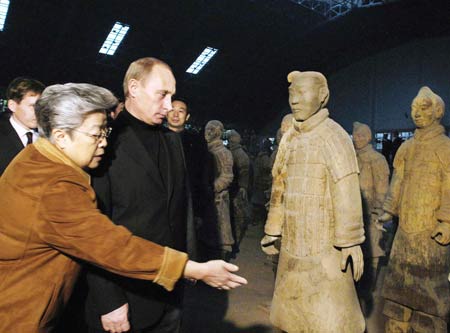| Zdravstvuyte, China |
| http://www.sina.com.cn 2005/07/14 20:09 thats China |
 Russia president Vladimir Putin visits Xi'an in October,2004 Nevertheless, Russian working girls can still be found in China. In the bars and restaurants around Beijing's Ritan Park, in Macau's gaudy casinos and in seedy nightlife spots all across the country, they prowl around looking for customers. They are no longer stateless aristocrats down on their luck. Instead, they're young women from small towns and cities who enter China on short-term tourist visas hoping to return home with bulging purses. Heavily made-up, they look older than their years and they all utter the same refrain: "There is no money in Russia." Their presence is a telling comment on the current economic situation in Russia. But for the vast majority of Russians here, China offers the chance to make money legitimately. With the Sino-Soviet split of the late Fifties and Sixties a distant memory, trade is booming. Tanya and Lena are sisters who came to work in Beijing three years ago and are able to offer a unique perspective because not only are they Russian, they're also ethnic Chinese. "Our parents left Heilongjiang in the Seventies during the 'Cultural Revolution'," says Tanya, who works in the steel industry. They settled in a small town north of Vladivostock, where the sisters were born and went to school. "There were no other Chinese around then. I remember one old guy who was married to a Russian woman. Most people thought we were Koreans. "But there were no problems at school. There was the usual kids stuff but we'd fight with the boys and after that it was okay." So integrated were they that Tanya became a Young Pioneer, the old Soviet Union's politically-orientated version of the Scout movement. "We did a lot of sport and social activities but on April 22nd, Lenin's birthday, we'd all march to Lenin's statue and there'd be a big ceremony," she recalls. After going to university in Vladivostock, the sisters moved to China. "It was an accident really; the company I worked for opened an office in Beijing. Lena was studying in Shanghai and decided to stay on." Despite their heritage, they regard themselves as Russians. "Of course, I know that my roots are in China but I feel Russian. We speak Chinese with our parents but when we're together we speak Russian. It's easier for us and more natural, because that's what we grew up speaking," notes Tanya. "But people here assume I'm Chinese and I can pretend to be Chinese, even if I don't feel Chinese. You can use it when it suits you." Even with the advantage of speaking putonghua almost as well as native Beijingers, both Tanya and Lena sometimes find themselves at a loss when dealing with the locals. "The mentality of the people is so different. There's a Chinese way of thinking and a Russian one. It's like the difference between Asian people and European people. When you're in China you don't notice it so much because you're in the middle of it, but you do when you go home. It's a different way of behaving and reacting to things." Like all the Russians in China, they feel a deep connection with their homeland and clearly miss it, even if life is much safer in Beijing than it is in Russia. It's one of the reasons why the Russian community in Beijing is so tight-knit and so often found in the Russian restaurants near their vast embassy off Dongzhimennei, reputedly the largest embassy in the world, or in the Ritan Park area, the site of the first Russian and foreign restaurants in China and where the shop signs in and around Yabao Lu are in Cyrillic rather than Mandarin. "Russians here like to go to the Russian restaurants because they like to feel at home. They get everything they want: Russian food and drink, loud music," smiles Tanya. "Most of the Russians in Beijing aren't here because they like China. They're not like the other foreigners who come here because they like China, or they're interested in it and want to learn the language. The Russians are here for the money." Natalia Karelova believes there is little motivation for the Russian community to mix either with the Chinese or other foreigners. "The official Russian community, the embassy people and so on, have limited contacts with the Chinese because of their jobs and they have their families here, so they don't need to mix. They live a very Russian life, only in Beijing. It's different for the businessmen, they do have to communicate with the Chinese because they're doing business with them." Tanya is enough of a patriot to dismiss the notion that the events following the collapse of the Soviet Union have seen China take the upper hand in the relationship between the two countries. "I think Russia is still powerful. There are a lot of Russians doing very well. The people I work with are doing big business; they're in positions they could never have been in under the communists. Russia isn't finished. They still have 100 percent literacy, which they don't have here." Last month, the Russians and Chinese governments reached an agreement on their long-disputed northern border. The presence of the Russia and Chinese foreign ministers in Vladivostock to sign the agreement, as well as Chinese president Hu Jintao's recent visit to Moscow for the 60th anniversary of the end of WWII, is a sign of how healthy the relationship between the two countries is now. With trade links increasing all the time, that relationship will become even closer. The next chapter in the history of the Russians in China hasn't been written yet, but it's a story that will run and run. |
| 【评论】【论坛】【收藏此页】【大 中 小】【多种方式看新闻】【下载点点通】【打印】【关闭】 |